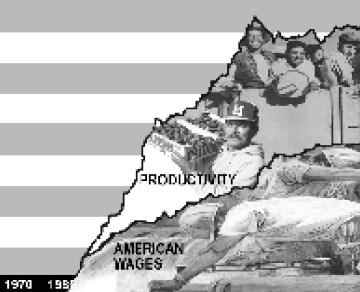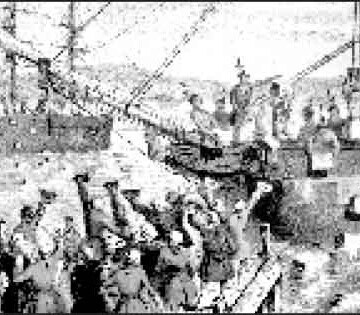The Federal Deposit Insurance Corporation (FDIC) just reported that U.S. banks lost money at a $100 billion annualized rate during the fourth quarter of 2008. Sounds grim, but it only describes the visible part of the iceberg our financial Titanic has hit. AIG, a giant insurance company, alone has been covered by the Federal Reserve...
Author: David Hartman (David Hartman)
The Perfect Storm
The best-seller The Perfect Storm tells a true story of a ship caught in a vortex created by a continental low-pressure system, a tropical hurricane, and an arctic cold front off the shores of Newfoundland. This complex disaster comes to mind when trying to describe the nature of the crisis that nearly closed down the...
The Revelations of the Obama Plan: Change We Can’t Afford
The Democratic nominee for president has finally offered the details of his campaign theme—that he will radically change America if elected—by posting on his website “The Blueprint for Change: Barack Obama’s Plan for America.” Senator Obama’s call for “change” has mesmerized America’s youth and raised unprecedented grassroots donations. Every American longing for real change that...
Anatomy of a Meltdown: The Subprime Crisis
At the close of 2007, the bloated inventories and declining prices of residential housing confirmed that the real-estate bubble had burst. This was triggered by losses on collateralized mortgage obligations (CMOs), which are based on pools of “subprime” mortgage collateral. Residential prices have not yet fallen below the levels of 2001 (when the bubble began)...
Reflections on Immigration Reform
The most significant event of President George W. Bush’s second term (thus far) has been the defeat of the Comprehensive Immigration Reform Act of 2007 (S.1348). This bill was initiated by President Bush in collaboration with the Democratic congressional majority, over the opposition of the Republicans and a few rebellious Democrats. The real winners of...
The Economic Realities of U.S. Immigration
Mass immigration is changing the fundamental character of America—our culture, institutions, standards, and objectives. Until recently, our society was the envy of the world, so why are these changes even necessary? In addition to the ruling class’s commitment to globalism and multiculturalism, the chief reason that is given in support of open borders is the...
The Price of Globalism
It is paradoxical that, having led the Western world to triumph over fascism and then communism, the United States is now the vanguard of yet another world socialist order. This American Empire, based on the benevolent neoconservative principles of borderless free enterprise, trade, and migration and consisting of multicultural social democracies enforced by U.S. military...
Marx’s and Engels’ Illegitimate Offspring
If someone is overheard referring to the system of U.S. public finance as “socialist,” most Americans within earshot will write him off as a conservative crank who is being dragged kicking and screaming into the 21st century. After all, Karl Marx is long gone, and so is his most ardent American disciple, Franklin Delano Roosevelt,...
A Step in the Right Direction
On November 1, 2005, the President’s Advisory Panel on Federal Tax Reform issued its final report and received a chilly response from the proponents of tax reform (too much tax, and too little reform). However, its proposals constructively addressed key issues that could lead to a simplification of the tax code—to the extent that our...
Cracks in the Crystal Ball
As the 21st century began, Americans appeared to have every reason to consider themselves the most fortunate citizens in the world. Though there are problems in virtually every sector of our society, resolutions are still within our reach and capabilities. Although the abundant nonrenewable natural resources our forebears found for the taking have largely been...
Dubious Dubya Budgets
As the federal Fiscal Year 2005 approaches completion and the 2006 budget takes shape, the lack of fiscal discipline of the George W. Bush presidency continues to enlarge upon the “politics of joy,” which have characterized the Republican Party since the end of World War II. No longer aspiring to be the party of frugality...
Essentials for a Lasting Peace in the Middle East
No solution to the conflict between Israel and the Palestinians is possible unless we clearly define the obstacles that can and must be surmounted. This conflict, which culminated in open warfare in 1948, is rooted in the incompatible claims of two distinct groups regarding the same territory and resources. In 1947, the United Nations partitioned...
Diagnosing the Diminishing Dollar
Holding a green piece of paper decorated with patriotic symbols as a proxy for economic value is an act of faith. To do so with the currency of your own country is a necessary act of faith, since daily life requires it in order to make economic transactions. But to hold sizable amounts of the...
The Bush Economic Agenda
Energized by his election as if it were a landslide, President George W. Bush proposes to spend his “political capital” on an ambitious economic agenda headed by reform of Social Security and the U.S. Tax Code. The President’s candor in acknowledging that the deficits and tax cuts of his first term—the “Wall Street Relief and...
Taxation for Economic Survival
The severity of the ongoing decline of U.S. manufacturing has placed our prosperity and national security in jeopardy. A principal cause of this crisis is the federal tax code, which currently imposes multiple layers of progressive taxation on U.S. goods. The result, as many economists acknowledge, is crippling: a double taxation of savings for investment...
What Manufacturing Crisis?
The recent U.S. recession, if judged by its effect on total employment, was the shortest and mildest of the post-World War II period. In the six months from the peak of July 1998 to the low of January 1999, employment declined by only 1.43 million workers, and, by May 2004, 7.5 million additional workers were...
Grading Greenspan
President Bush’s recent announcement that he will renominate Alan Greenspan for a fifth term as chairman of the Federal Reserve Board elicited mostly favorable reactions from a wide range of economic and political pundits. At the critical end of the spectrum, economist James Galbraith, in an op-ed entitled “Greenspan, The man who stayed too long,”...
Europe’s Population Implosion
Over the course of the last millennium, the populations of Europe (including Russia) and its Western offshoots (including the United States) grew explosively. Fueled by the agricultural and industrial revolutions that they pioneered and the raw materials of the New World that they settled, combined European-derived populations grew from less than one sixth to one...
Revolting Taxation
On April 15, U.S. taxpayers will pay the last installment on their duty to government for 2003. The bill for federal, state, and local government totaled a staggering $3.3 trillion, of which one out of every seven dollars was in the form of “buy now, pay later” deficits, principally the federal one. Federal spending accounted...
The End of Income Taxes
The tax cuts proposed by President George W. Bush take significant steps toward the reform of a federal tax code that retards growth of the capital stock, productivity, and incomes of all Americans. His plan to eliminate the death tax, increase expensing of investment for small businesses, end double taxation of dividend income, expand “returns...
Wall Street’s Turn
While a long parade of executives has exchanged tailored pinstripes for orange jumpsuits, an even more deserving group of miscreants have thus far eluded their just deserts—those executives’ Wall Street overlords, who wrote the script for the latest and greatest of bull markets, directed the hucksters, and set their standards. The excesses of the bull...
Dr. Pangloss on Taxation
The IRS and the federal tax code have enabled the blessings of government on a scale never envisioned by the Founding Fathers. Consider the vital contributions to the current status of the federal government and its future prospects for growth made possible by the tax code, generally, and progressive taxation, in particular. First, the incredible...
Gross National Greed
Editor’s Note: The Sarbanes-Oxley Act of 2002, which President Bush signed into law on July 30, is designed to increase corporate responsibility. It is a step in the right direction, but it fails to address the central role played by Wall Street. Some CEOs and CFOs may go to jail, but, as usual, the people...
What’s Good for General Motors . . .
How did big corporations become the prevailing form of enterprise in the United States? The standard answer is that bigger is better. Concentrated industry, we are told, allows managerial efficiency, huge economies of scale, and the ability to undertake bold research and development and apply it to better products and increasingly efficient process technology. But...
The Myth of Economic Equality
Except in war-time, Washington matters little to the comfort and safety of responsible Americans. Washington does matter, however, as the major source of impoverishment, harassment, and jeopardy. Our Founding Fathers never intended it to be this way. The last thousand years have been defined by revolutions that freed peoples throughout the civilized world. Yet at...
Restoring Families by Restricting Government
When we view the monumental seats of government, the palaces and temples of ancient and medieval civilizations, we are awed by their architectural grandeur, the art and culture to which they testify, and the sheer effort they represent. While they are indeed a part of our cultural heritage, these edifices are better understood as monuments...
The Education Cartel
The education cartel in Texas, and the Texas Education Agency (TEA) in particular, have raised the bureaucratic art to new heights by congratulating themselves for failing to attain their mediocre objectives. Consider a report, released by the Tax Research Association of Houston and Harris County and the Acres Home Chamber of Commerce, on the credibility...
Reflections on a Texan’s Visit to Bosnia
Since returning from a visit to Bosnia-Herzegovina arranged by The Rockford Institute to consult with the Republic of Srpska (one of Bosnia’s component states) on privatization of its socialist industries, I have given considerable thought as to what Americans (especially Texans) might learn from the recent decomposition of Yugoslavia. Yugoslavia was created after World War...




